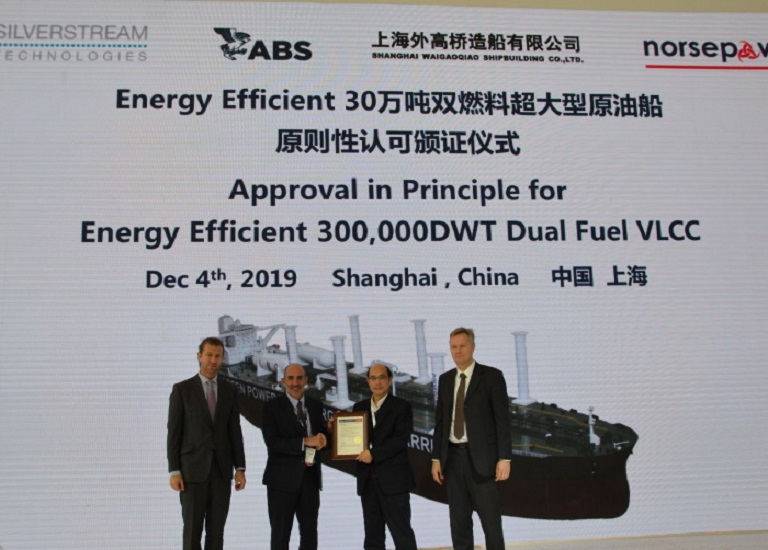Norsepower Oy Ltd., the leading provider of low maintenance, software operated, data verified auxiliary renewable wind propulsion systems, today announced the completion of a joint development project with SWS (Shanghai Waigaoqiao Ship Building Co., Ltd) for developing an energy efficient dual fuel VLCC design that has gained approval in principle (AiP) from Lloyds Register and ABS. Under the agreement, Rotor Sails were implemented in the VLCC design for improving the fuel efficiency and reducing emissions.

The impact of the installation of Norsepower’s Rotor Sail solution, including a review of structural reinforcement and visibility calculation, was reviewed using computational-fluid dynamics (CFD) during the joint development project (JDP) - confirming a potential of 6-10% fuel and emissions savings, dependent on operating routes.
The Norsepower Rotor Sail Solution, which can be installed on new vessels or retrofitted on existing ships without off-hire costs, is a modernised version of the Flettner rotor - a spinning cylinder that uses the Magnus effect to harness wind to propel a ship. The solution is fully automated and senses whenever the wind is strong enough to deliver fuel savings, at which point the rotors start automatically – optimising crew time and resource.
In addition to this announcement, Norsepower’s Rotor Sails have been installed onboard three vessels, including Bore’s M/S Estraden, a 9,700 DWT Ro-Ro carrier, Viking Line’s M/S Viking Grace, an LNG–fuelled cruise ferry, and Maersk Tanker’s 110,000 DWT Maersk Pelican. Norsepower has also recently started a delivery project of a Rotor Sail to a hybrid ferry owned by Danish shipping company Scandlines.
The official signing took place during a press conference arranged by SWS at Marintec China in Shanghai, during which the designs and specifications of the vessels were unveiled.
This handover of AiP certificates to the shipyard demonstrates the potential for reducing emissions in ship designs that is cost effective and allows the shipping industry to address the challenge of reducing greenhouse gas (GHG) emissions by 2050.
Liu Jianfeng, Chief Technologist of SWS, said: “We have focused on developing clean and smart ships that are technically reliable and commercially feasible. We are proud to design advanced ships that will benefit ship owners and lead eco-friendly shipping.”
Jukka Kuuskoski, CSO of Norsepower, said: “We are very pleased to be collaborating with SWS, Lloyd’s Register and ABS on this project. This partnership allows industry leading organisations to explore cleaner solutions for the oil tanker market and drive shipping towards a modern era of auxiliary wind propulsion for the global maritime industry.”
Source: Norsepower